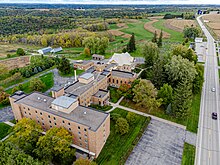
Viterbo University is a private Catholic university in La Crosse, Wisconsin. Founded in 1890 by the Franciscan Sisters of Perpetual Adoration, Viterbo is home to three colleges with nine schools offering 48 academic programs at the associate, bachelor's, master's, and doctoral levels.

Rose of Viterbo, TOSF, was a young woman born in Viterbo, then a contested commune of the Papal States. She spent her brief life as a recluse, and was outspoken in her support of the papacy. Otherwise leading an unremarkable life, she later became known for her mystical gifts of prophecy and having miraculous powers. She is honoured as a saint by the Catholic Church.
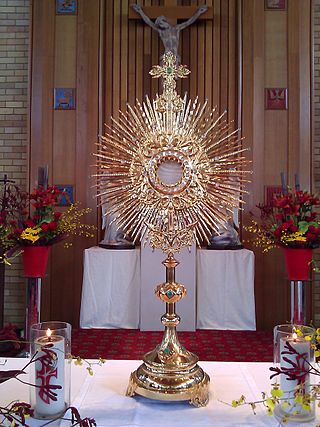
Eucharistic adoration is a devotional practice primarily in Western Catholicism and Western Rite Orthodoxy, but also to a lesser extent in certain Lutheran and Anglican traditions, in which the Blessed Sacrament is adored by the faithful. This practice may occur either when the Eucharist is exposed, or when it is not publicly viewable because it is reserved in a place such as a tabernacle.
John Joseph Paul was an American prelate of the Roman Catholic Church who served as an auxiliary bishop and bishop of the Diocese of La Crosse in Wisconsin from 1977 to 1994

The Roman Catholic Diocese of La Crosse is a Latin Church diocese in west-central Wisconsin in the United States. The metropolitan for the diocese is the Archdiocese of Milwaukee. The mother church is the Cathedral of Saint Joseph the Workman in La Crosse.
The Sisters of St. Francis of the Martyr St. George is a Roman Catholic Congregation of consecrated women whose spirituality is derived from St. Francis of Assisi. Mother M. Anselma Bopp and Father John Gerard Dall founded the Order in Thuine, Germany, in 1869. The Order expanded to the U.S. in 1923 with the founding of a Provincialate and Novitiate in Alton, Illinois, which continues to be the location of the Provincial House. They are also located in other areas of Illinois, Missouri, Oklahoma, Nebraska, Kansas, New Jersey, Ohio, Washington, D.C., and Wisconsin, as well as on missions in Brazil and Cuba.
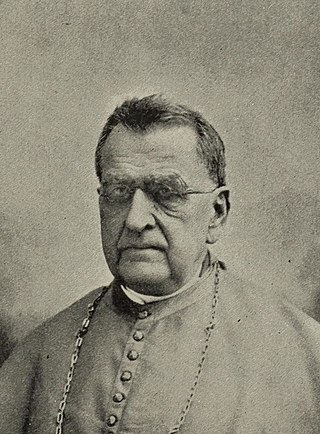
Michael Heiss was a German-born prelate of the Roman Catholic Church who served as the first bishop of the Diocese of La Crosse in Wisconsin (1868–1880) and the second archbishop of the Archdiocese of Milwaukee in Wisconsin (1881–1890).

Kilian Caspar Flasch was a German-born prelate of the Roman Catholic Church who served as bishop of the Diocese of La Crosse in Wisconsin from 1881 until his death in 1891.
William Richard Griffin was an American prelate of the Roman Catholic Church who served as auxiliary bishop of the Diocese of La Crosse, Wisconsin.
The Sisters of St. Francis of Perpetual Adoration is a papal congregation of the Roman Catholic Church, founded on July 20, 1863, by Mother Maria Theresia Bonzel in Olpe, Germany. In 1875, they opened St. Elizabeth Hospital in Lafayette, Indiana; now part of the Franciscan Health healthcare system. In 1890 they founded Saint Francis Normal School, a teacher training school; which is now the University of Saint Francis (Indiana).

The Institute of the Franciscan Sisters of the Eucharist (FSE) is a Roman Catholic religious congregation for women. The motherhouse is in Meriden, Connecticut, in the Roman Catholic Archdiocese of Hartford.
The Sisters of St. Francis of Assisi is a Catholic religious congregation for women founded in 1849. The motherhouse is in St. Francis, Wisconsin, in the Archdiocese of Milwaukee.
The Sisters of St. Joseph of the Third Order of St. Francis (SSJ-TOSF) is a Roman Catholic Franciscan religious congregation for women. The Congregation was established in 1901. Their motherhouse was in Stevens Point, Wisconsin in the Diocese of La Crosse.
The Third Order of Saint Francis is a third order in the Franciscan tradition of Christianity, founded by the medieval Italian Catholic friar Francis of Assisi.

St. Rose of Viterbo Convent is the motherhouse of the Franciscan Sisters of Perpetual Adoration, an American religious congregation, which is located in La Crosse, Wisconsin. The convent is dedicated to Rose of Viterbo, a 13th-century Franciscan tertiary who was a noted mystic and street preacher in Italy who died while still a teenager.
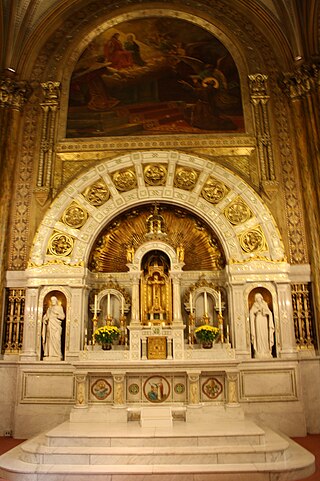
Tadeusz Żukotyński was a Polish count, professor, and painter.

Paul Matthias Dobberstein was a German American priest and architect.
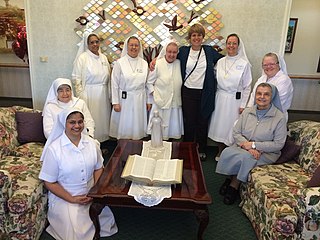
The Franciscan Hospitaller Sisters of the Immaculate Conception are members of a Roman Catholic religious institute of consecrated women, which was founded in Portugal in 1871. They follow the Rule of the Third Order Regular of St. Francis. and, as the term “hospitaller” indicates, focus their ministries on a spirit of medical care. Their charism emphasizes hospitality and service under the model of the Good Samaritan. In this congregation, the postnominal initials used after each sister's name is "F.H.I.C."


